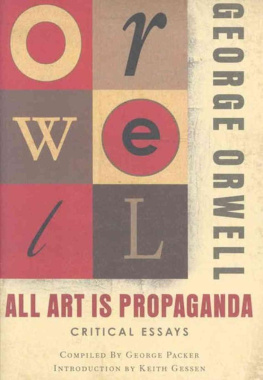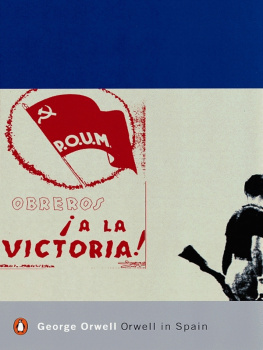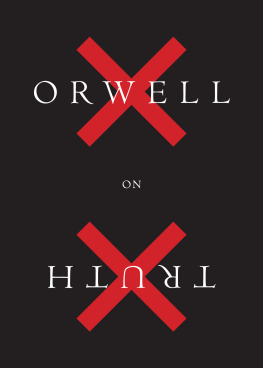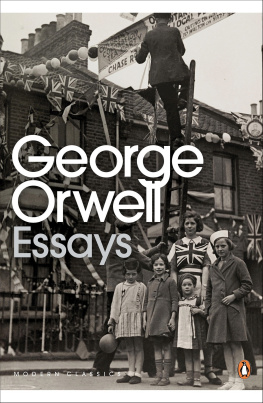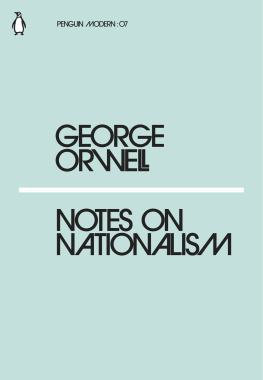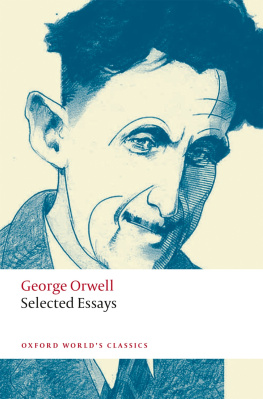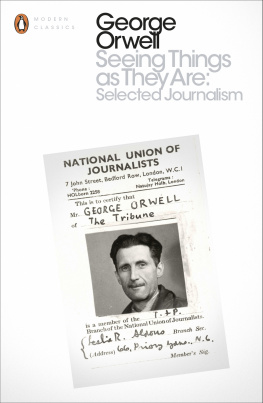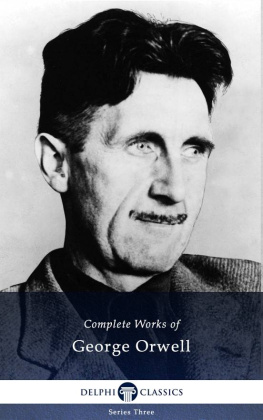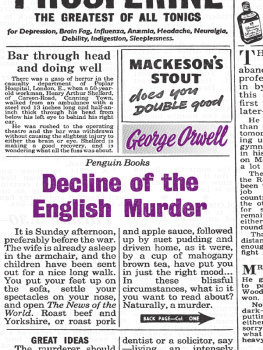All Art Is Propaganda
George Orwell
Mariner Books / Houghton Mifflin Harcourt
BOSTON NEW YORK
First Mariner Books edition 2009
Compilation copyright 2008 by The Estate of the late Sonia Brownell Orwell
Foreword copyright 2008 by George Packer
Introduction copyright 2008 by Keith Gessen
All rights reserved
For information about permission to reproduce selections from this book,
write to Permissions, Houghton Mifflin Harcourt Publishing Company,
215 Park Avenue South, New York, New York 10003.
www.hmhbooks.com
Essays collected from The Complete Works of George Orwell, edited by Peter Davison,
OBE, published in Great Britain in 1998 by Secker & Warburg. Grateful
acknowledgement is made to Peter Davison for permission to draw from his notes.
Excerpts from "The Dry Salvages" in Four Quartets, copyright 1941 by
T. S. Eliot and renewed 1969 by Esme Valerie Eliot, reprinted by permission
of Houghton Mifflin Harcourt Publishing Company.
Excerpts from "East Coker" in Four Quartets, copyright 1940 by T. S. Eliot
and renewed 1968 by Esme Valerie Eliot, reprinted by permission
of Houghton Mifflin Harcourt Publishing Company.
Excerpt from "Spain" from Selected Poems, Expanded Edition
by W. H. Auden, edited by Edward Mendelsohn. Used by permission
of Vintage Books, a division of Random House, Inc.
Library of Congress Cataloging-in-Publication Data
Orwell, George, 19031950.
All art is propaganda: critical essays/by George Orwell; compiled by George Packer;
with an introduction by Keith Gessen.1st ed.
p. cm.
Includes bibliographical references.
I. Packer, George, 1960II. Title.
PR6029.R8A626 2008
824'.912dc2 2 2008012356
ISBN 978-0-15-101355-5
ISBN 978-0-15-603307-7 (pbk.)
Text set in Garamond MT
Designed by Cathy Riggs
Printed in the United States of America
DOC 10 9 8 7 6 5 4 3 2 1
CONTENTS
Foreword by George Packer ix
Introduction by Keith Gessen xvii
Charles Dickens 1
Boys' Weeklies 63
Inside the Whale 95
Drama Reviews: The Tempest, The Peaceful Inn 141
Film Review: The Great Dictator 144
Wells, Hitler and the World State 148
The Art of Donald McGill 156
No, Not One 169
Rudyard Kipling 177
T. S. Eliot 194
Can Socialists Be Happy? 202
Benefit of Clergy: Some Notes on Salvador Dali 210
Propaganda and Demotic Speech 223
Raffles and Miss Blandish 232
Good Bad Books 248
The Prevention of Literature 253
Politics and the English Language 270
Confessions of a Book Reviewer 287
Politics vs. Literature: An Examination of Gulliver's Travels 292
Lear, Tolstoy and the Fool 316
Writers and Leviathan 337
Review of The Heart of the Matter by Graham Greene 346
Reflections on Gandhi 352
Notes 363
FOREWORD
B EFORE anything else, George Orwell was an essayist. His earliest published pieces were essays; so were his last deathbed writings. In between, he never stopped working at the essay's essential task of articulating thoughts out of the stuff of life and art in a compressed space with a distinctly individual voice that speaks directly to the reader. The essay perfectly suited Orwell's idiosyncratic talents. It takes precedence even in his best-known fiction: During long passages of 1984, the novelistic surface cracks and splits open under the pressure of the essayist's concerns. His more obscure novels of social realism from the 1930s are marked, and to some extent marred, by an essayist's explaining; and his great nonfiction books, Down and Out in Paris and London, The Road to Wigan Pier, and Homage to Catalonia, continually slip between particular and general, concrete and abstract, narration and exposition, in a way that would be alien to a storytelling purist and that defines Orwell's core purpose as a writer. As soon as he began to write something, it was as natural for Orwell to propose, generalize, qualify, argue, judgein short, to thinkas it was for Yeats to versify or Dickens to invent. In his best work, Orwell's arguments are mostly with himself.
Part of the essay's congeniality for Orwell is its flexibility. All a reader asks is that the essayist mean what he says and say something interesting, in a voice that's recognizably his; beyond that, subject matter, length, structure, and occasion are extremely variable. Orwell, who produced a staggering amount of prose over the course of a career cut short at forty-six by tuberculosis, was a working journalist, and in the two volumes of this new selection of his essays you will find book, film, and theater reviews, newspaper columns, and war reporting, as well as cultural commentary, literary criticism, political argument, autobiographical fragments, and longer personal narratives. In Orwell's hands, they are all essays. He is always pointing to larger concerns beyond the immediate scope of his subject.
Orwell had the advantage of tradition: He worked in the lineage of the English essay dating back to the eighteenth century, whose earlier masters were Samuel Johnson, Charles Lamb, and William Hazlitt, and whose last great representative was Orwell himself. Within this tradition it was entirely natural for a writer to move between fiction and nonfiction, journalism and autobiography, the daily newspaper, the weekly or monthly magazine, and the quarterly review; and between the subjects of art, literature, culture, politics, and himself. This tradition hasn't thrived in the United States. Our national literature was born with the anxieties and ambitions of New World arrivistes, and Americans have always regarded the novel as the highest form of literary art; if we recognize essays at all, it's as the minor work of novelists and poets (and yet some of the greatest modern essayistsJames Baldwin and Edmund Wilson, to name twohave been Americans). As for journalism of the kind that Orwell routinely turned out, the word itself has suggested something like the opposite of literature to an American reader. The English essay comes out of a more workmanlike view of what it means to be a writer: This view locates the writer squarely within the struggles of his historical time and social place, which is where the essayist has to live.
A tradition in which the line between writer and journalist is hard to draw allows plenty of room for the characteristic qualities of the Orwell essay: his informal, direct prose style; his interest in sociological criticism that takes in both high and popular culture; his penchant for overstatement and attack; his talent for memorable sentences, especially his openings, which a journalist would call the lede: "In Moulmein, in Lower Burma, I was hated by large numbers of peoplethe only time in my life that I have been important enough for this to happen to me"; "Saints should always be judged guilty until they are proved innocent"; "There is very little in Eliot's later work that makes any deep impression on me"; "Dickens is one of those writers who are well worth stealing." The American critic Irving Howe wrote in his autobiography A Margin of Hope that when he set out to learn to write essays in the 1940s, he turned to Orwell: "How do you begin a literary piece so as to hold attention? George Orwell was masterful at this, probably because he had none of the American literary snobbism about doing 'mere journalism.'"
Orwell lived in and wrote about interesting times: war, ideological extremism, intellectual combat, dilemmas over the role of the writer in a period of partisanship and upheaval. "In a peaceful age I might have written ornate or merely descriptive books, and might have remained almost unaware of my political loyalties," he speculates in "Why I Write." "As it is I have been forced into becoming a sort of pamphleteer." If it's true, then we can be grateful for the timing of Orwell's birth, since his talent was never going to lie in updating the nineteenth-century naturalistic novel. The work Orwell started doing to pay the bills while he wrote fictionhis reviews, sketches, polemics, columnsturned out to be the purest expression of his originality. "Pamphleteer" might suggest a kind of hack, but in Orwell's case it's an essayist with a cause.
Next page
